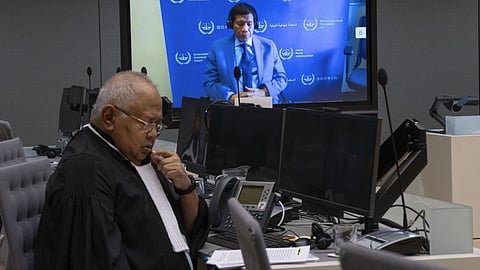
- NEWS
- the EDIT
- COMMENTARY
- BUSINESS
- LIFE
- SHOW
- ACTION
- GLOBAL GOALS
- SNAPS
- DYARYO TIRADA
- MORE

The International Criminal Court (ICC) has extended the deadline for the disclosure of material evidence in relation to former president Rodrigo Duterte's crimes against humanity case, providing the prosecution additional time to ensure the safety of witnesses prior to revealing their identity.
The decision was made after the prosecution sought to push back the closing date for the documentary materials that formed the basis of Duterte's arrest warrant until 1 July, and the applications to withhold the witnesses' identities until 20 June.
The ICC Pre-Trial Chamber I took note that neither the lawyers of Duterte nor the Office of Public Counsel for Victims (lawyers of the drug war victims) opposed the said request, thereby allowing it to extend the deadline pursuant to the prosecution's motion.
"The Chamber considers that good cause is shown […] to grant an extension of the relevant time limits. Accordingly, the chamber hereby extends the time limit for the disclosure of the arrest warrant materials relating to the relevant witnesses mentioned in the request until 1 July 2025," the decision dated 20 May reads.
"Furthermore, the chamber hereby also extends the time limit for any applications for redactions not falling into the standard categories, non-disclosure of witnesses' identities, or non-disclosure of entire items of evidence until 16 June 2025," the document added.
Earlier, lead prosecutor Karim Khan, currently on leave amid an ongoing probe into allegations of sexual misconduct, petitioned the chamber to delay the disclosure of the witnesses, citing concerns that "the immediate disclosure of their identities would give rise to an objective risk to their safety."
The prosecution had argued that the deadline extension was reasonable and consistent with Duterte's and the witnesses' rights.
ICC assistant to counsel Kristina Conti, one of the lawyers of the drug war victims, underscored the importance of ensuring that protective measures are in place before revealing their identities and that they are "comfortable" with disclosing their identities and the content of their testimonies.
She raised the possibility that law enforcers may stand as "insider witnesses" in Duterte's looming pre-trial at the ICC, pointing out that this is not unusual, as they have firsthand knowledge regarding the execution of policies and orders from higher-ups.
Conti explained that these "insiders" would be required to narrate how the summary killings under the deadly anti-narcotics campaign of the Duterte administration were carried out, confirm whether they acted on orders from their respective bosses, and if they were compensated for doing so.
"There will be witnesses [to] the incident — either victims or law enforcement agents. At the same time, they could be considered as 'insider witnesses' where they could talk about the pattern, instructions, and any actions taken before and after the incident," she said, partly in Filipino, in an interview on Tuesday.
"We're expecting a few law enforcement officers. I can't say if they are in active duty still or retired, resigned, but certainly, the ICC has not presented any case without insider witnesses. So we're pretty sure they have already talked to some," Conti continued.
In a congressional hearing last year, retired police colonel Royina Garma — Duterte's alleged trusted aide — confirmed under oath that police were given cash incentives in exchange for killing drug suspects. The monetary rewards, she said, ranged from P20,000 to P1 million, depending on the prominence of the target.
Furthermore, Garma claimed that this payout scheme was modeled after the "Davao template," allegedly developed during Duterte's tenure as Davao City mayor.
Duterte himself repeatedly admitted before lawmakers that he encouraged police to provoke drug suspects to fight back as a pretext to kill them, but insisted that they should not be held liable, claiming sole responsibility for the massive killings.
The government logged more than 6,000 deaths related to the anti-narcotics campaign, though rights groups estimated that the actual death toll probably exceeded as high as 30,000, affecting predominantly low-income communities.
The 80-year-old Duterte has been under the ICC's custody since his arrest on 11 March in Manila. He faces a single count of crimes against humanity in connection with 43 extrajudicial killings committed between 1 November 2011 and 16 March 2019, spanning his time as mayor of Davao City and as president.
The ICC argued that such a period covers the time when the Philippines was still a member of the Rome Statute, dismissing objections from critics that it has no jurisdiction over Duterte since the country had already withdrawn as a state party in March 2019.
The former president will remain in The Hague while awaiting the confirmation of his charges scheduled for 23 September.
Duterte’s lead legal counsel, Nicholas Kaufman, previously confirmed that the application for the temporary release of the erstwhile leader is already in the works—a move that lawyers of the drug war victims warned they will strongly oppose.
